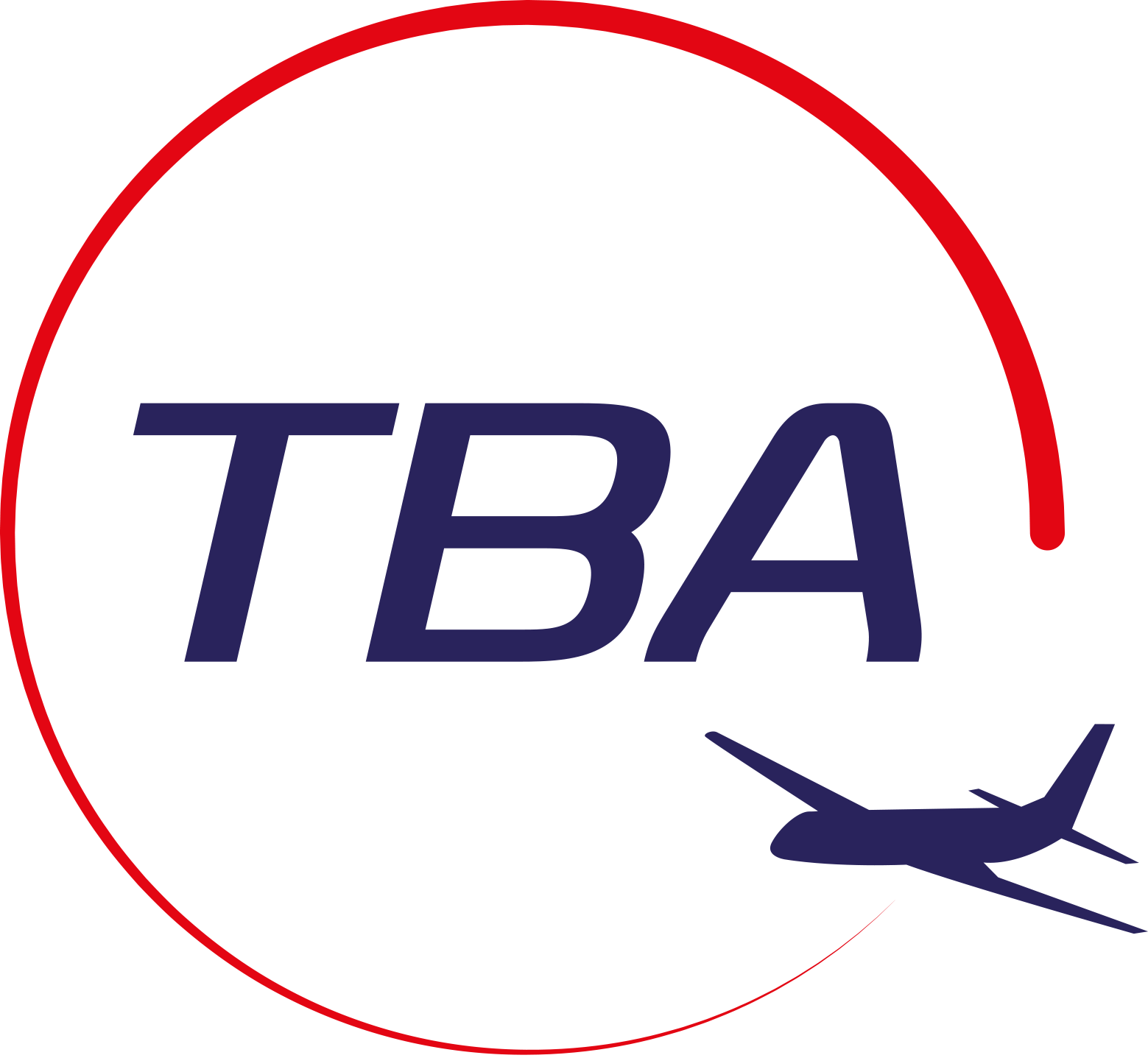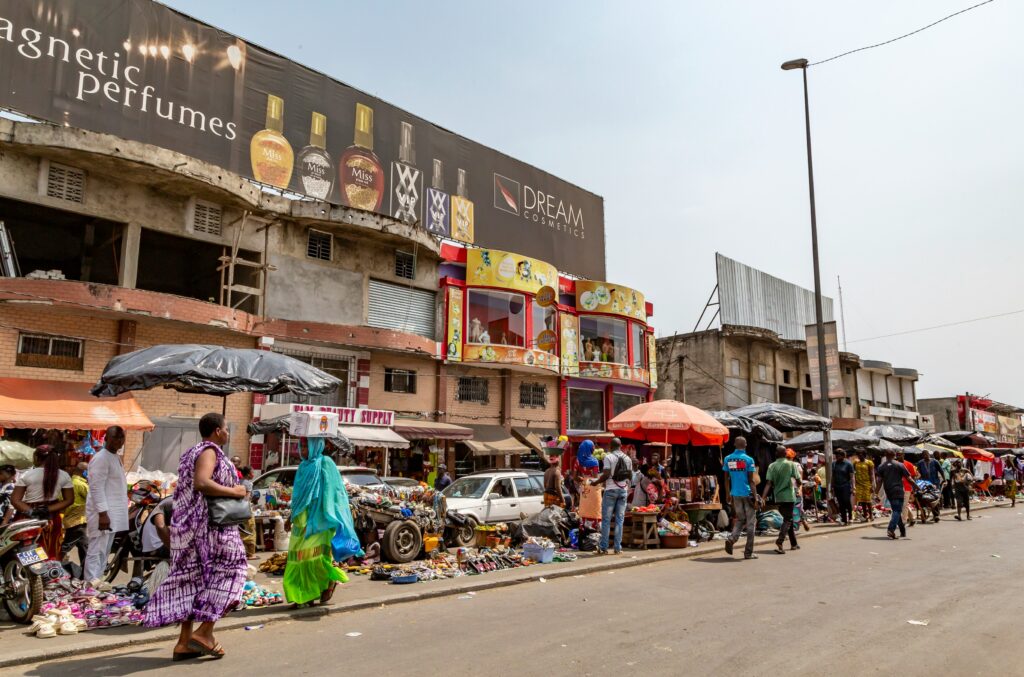
Research and knowledge are the first steps for Côte d’Ivoire Travel Business Assistance. Here is a fact file for Côte d’Ivoire to get you started. Contact us if you are looking to start a business in or expand your market to Côte d’Ivoire. We have consultants ready to help you on the ground in Côte d’Ivoire.
Save time and resources on market expansions – Schedule a complimentary consultation with Travel Business Assistance today.
Basic Facts
Origin of the name: Originally, Portuguese and French merchant-explorers in the 15th and 16th centuries divided the west coast of Africa, very roughly, into four “coasts” reflecting resources available from each coast. Côte d’Ivoire was thus named by the French and the Portuguese named it the Costa do Marfim—both meaning “Coast of Ivory”. There was also a Pepper Coast, also known as the “Grain Coast” (present-day Liberia), a “Gold Coast” (Ghana), and a “Slave Coast” (Togo, Benin and Nigeria). Like those, the name “Côte d’Ivoire” reflected the major trade that occurred on that particular stretch of the coast: the export of ivory.
History & Independence: The first recorded history of Côte d’Ivoire appears in the chronicles of North African (Berber) traders, who, from early Roman times, conducted a caravan trade across the Sahara. Five important states flourished in Côte d’Ivoire during the pre-European early modern period (1400 – 1800). By the end of the 1880s, France had established control over the coastal regions. In 1960, Félix Houphouët-Boigny, the son of a Baoulé chief, became Côte d’Ivoire’s father of independence.
Government: The government is divided into three branches: executive, legislative, and judicial. The Parliament of Côte d’Ivoire consists of the indirectly elected Senate and the National Assembly which has 255 members, elected for five-year terms. Côte d’Ivoire has been ruled by 05 x presidents since its independence.
Official Language: French the official language, is taught in schools and serves as a lingua franca.
Indigenous Languages: It is estimated that 78 languages are spoken in Côte d’Ivoire. A semi-creolized form of French, known as Nouchi, has emerged in Abidjan in recent years and spread among the younger generation. One of the most common indigenous languages is Dyula, which acts as a trade language in much of the country, particularly in the north, and is mutually intelligible with other Manding languages widely spoken in neighboring countries.
Population: In 2023 estimates are of about 29,3 Million inhabitants.
Time Zone: GMT
Climate: Most of the geography corresponds with Tropical Savanah climate type. With few Tropical Rainforest and Tropical monsoon in the south of the country.
Borders: The Republic of Côte d’Ivoire has borders with five countries: South: Atlantic Ocean – West: Liberia and Guinea – North: Mali and Burkina Faso – East: Ghana
Size: Côte d’Ivoire comprises 322,463 km2 (124,500 sq mi), of which 318,003 km2 (122,780 sq mi) is land and 4,460 km2 (1,720 sq mi) is water, which makes the country about the size of Germany.
Religion: Côte d’Ivoire is religiously diverse. Adherents of Islam (mainly Sunni) represented 42.5% of the total population, while followers of Christianity (mainly Catholic and Evangelical) comprised 39.8% of the population. An additional 12.6% of the population identified as Irreligious, while 2.2% reported following Animism (traditional African religions).
Currency: West African CFA Franc (XOF), there is a fixed exchange rate between CFA Franc and Euro (1 Euro = 655 CFA Franc) The exchange rate with other currencies is floating. 1 US Dollar (USD) currently about 596.09 CFA Franc (XOF) (07 August 2023)
https://www.oanda.com/currency-converter/en/?from=XOF&to=USD&amount=596.09
History and Key Events
- 1842 – France imposes protectorate over the coastal zone.
- 1893 – Ivory Coast was made into a colony.
- 1904 – Ivory Coast becomes part of the French Federation of West Africa.
- 1944 – Felix Houphouet-Boigny, who later became Ivory Coast’s first president, founds a union of African farmers, which develops into the inter-territorial African Democratic Rally and its Ivorian section, the Ivory Coast Democratic Party.
- 1958 – Ivory Coast becomes a republic within the French Community.
Independence
- 1960 – France grants independence under President Felix Houphouet-Boigny. He held power until he dies in 1993.
- 1990 – Opposition parties legalized; Houphouet-Boigny wins Ivory Coast’s first multiparty presidential election, beating Laurent Gbagbo of the Ivorian Popular Front.
- 1993 – Henri Konan Bedie becomes president following the death of Houphouet-Boigny.
- 1995 October – Mr. Bedie is re-elected in a ballot that is boycotted by opposition parties in protest at restrictions imposed on their candidates.
- 1999 December – President Bedie is overthrown in a military coup, replaced by General Robert Guei.
- 2000 October – General Guei is replaced by his challenger Laurent Gbagbo.
- 2010 December – Election commission declares Mr Ouattara the winner of presidential election run-off.
- 2020 November – Alassane Ouattara is re-elected for a third term.
Ivorian Food
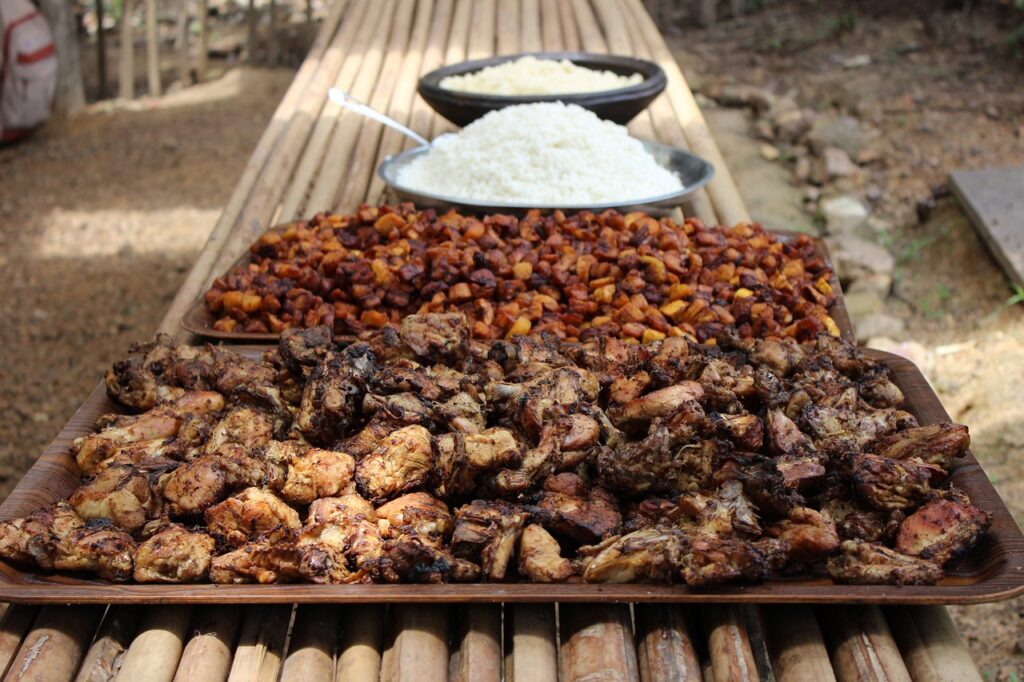
The cuisine of Côte d’Ivoire, or Ivory Coast is based on tubers, grains, pork, chicken, beef, seafood, fish, fresh fruits, vegetables, and spices. It is very similar to that of neighboring countries in West Africa, such as Ghana and Nigeria.
Ivorian cuisine includes dishes from all the different ethnic groups that live in the country, so it varies from region to region. Each major ethnic group boasts its local culinary specialties.
Sauces and stews are an important part of Ivorian cooking: there are many different sauces and stews such as slippery sauce, seed sauce, vegetable sauce, groundnut sauce, eggplant sauce and many others.
Ivorian cuisine is diverse, often very spicy and rich. Among Ivorian specialties are:
- Kedjenou – Chicken and Vegetables Stew
- Mafe – Peanut Butter Stew
- Poisson Braisé – Ivorian Grilled Fish
- Poulet Piquet – Grilled Chicken
- Choukouya – Ivorian Grilled Meat
- Soupe du Pêcheur (Fisherman’s Soup)
- Akpessi – Fish and Eggplant Stew
- Attieke – Fermented Cassava
- Foufou/ Fufu – Cassava and Plantain Dough
- Garba – Fermented Cassava And Fried Tuna
- Alloco – Fried Plantain
- Sauce Aubergine – Eggplant Stew
- Sauce Arachide – Palm Oil And Peanut Sauce With Meat
- Sauce Kaklou/ Sauce Kplè Ba – Ivorian Bush Mango Sauce
- Sauce Gouagouassou – Aubergine And Okra Sauce
- Sauce Djoumble – Okra Sauce
- Sauce Gnangnan – Eggplant Sauce
Attiéké is a popular dish made with grated cassava, very similar in taste and consistency to couscous. It is one of the most popular recipes in Côte d’Ivoire, especially in Abidjan. It is served with braised fish or meat, plantain, couscous, and cassava.
Kedjenou is a traditional Ivorian dish of slowly cooked chicken and vegetables. This dish originates from the center the country and is pressure cooked in a canari (pot made out of clay). It is cooked without water or oil and can be eaten with rice or attiéké.
Garba The King of street food in Côte d’Ivoire is the national Garba. It consists of Attiéké and deep-fried pieces of tuna. You can eat it well seasoned with tomatoes, chopped onions, and peppers, with a dash of oil from the fried tuna and seasoning. In some places it is served wrapped in a banana leaf.
Fisherman’s Soup is a very fresh sauce that smells divine and can be accompanied by seafood such as shrimp, lobster, and crab and even snails. It is eaten with a mixed red palm oil attiéké.
Things to see and do
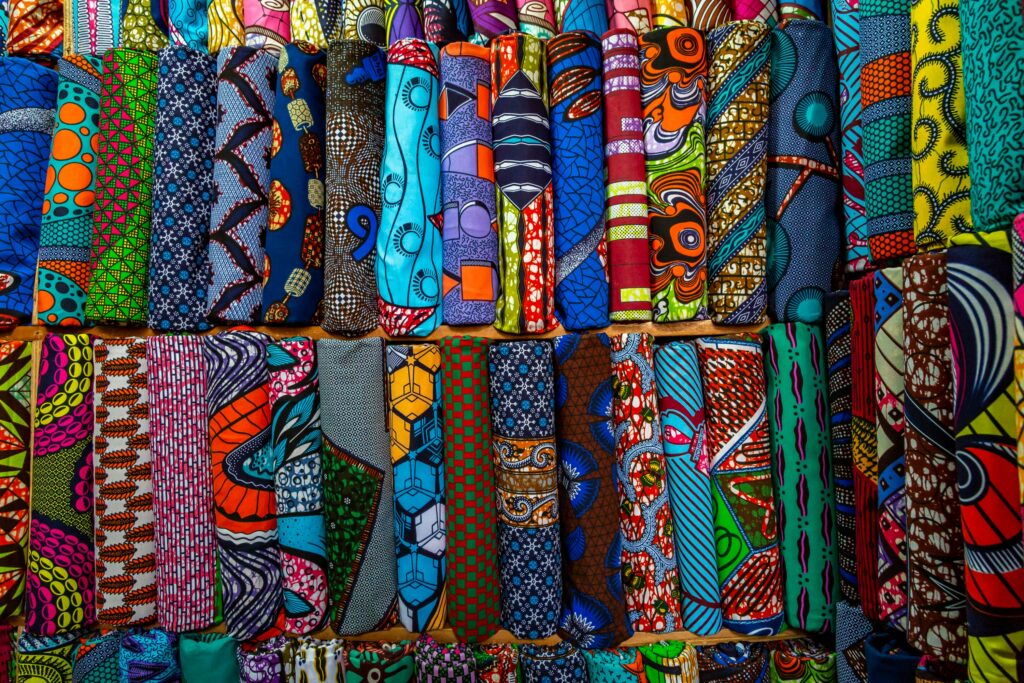
Ivory Coast, located on the West African coast, offers a vibrant tapestry of culture, history, and natural beauty. Abidjan, the economic capital, is known for its modern skyline, bustling markets, and lively nightlife. Grand-Bassam, a UNESCO-listed town, showcases colonial architecture and serene beaches. In the north, the mountainous region of Man beckons with scenic landscapes. For wildlife enthusiasts, Tai National Park houses diverse flora and fauna. The historic city of Yamoussoukro boasts the Basilica of Our Lady of Peace, one of the world’s largest churches. Ivory Coast is also renowned for its vibrant music, dance, and festivals, providing a rich and immersive cultural experience.
Tai National Park
Tai National Park in Ivory Coast is a UNESCO World Heritage Site renowned for its biodiversity and pristine rainforest. Spanning over 6,000 square kilometers, the park encompasses diverse ecosystems, from dense forests to savannas. Home to rare and endangered species, including pygmy elephants, chimpanzees, and the elusive Jentink’s duiker, the park is a haven for wildlife enthusiasts and researchers. Its unique flora includes ancient trees and medicinal plants. Tai National Park also holds cultural significance, as it is inhabited by local communities practicing traditional lifestyles. Despite conservation efforts, the park faces challenges such as poaching and habitat loss, highlighting the importance of ongoing protection measures.
Basilica of Our Lady Peace
The Basilica of Our Lady of Peace in Yamoussoukro, Ivory Coast, stands as a monumental testament to faith and architectural grandeur. Completed in 1989, it is one of the largest Christian churches globally, modeled after St. Peter’s Basilica in Vatican City. Its gleaming white façade, towering dome, and ornate interior create an awe-inspiring sight. The basilica is surrounded by expansive manicured gardens, enhancing its serene atmosphere. A symbol of national pride, it also reflects Ivory Coast’s unique blend of modernity and tradition. Pilgrims and tourists alike flock to admire the opulence and spiritual significance embodied by this iconic structure.
The National Costume Museum
The National Costume Museum in Ivory Coast provides a captivating journey into the country’s rich cultural heritage. Located in Abidjan, the museum showcases an extensive collection of traditional garments, accessories, and artifacts that reflect the diverse ethnic groups of the nation. Visitors can explore the intricacies of Ivorian attire, each piece telling a unique story about the wearer’s identity, rituals, and social status. The museum offers a vibrant tapestry of colors, patterns, and craftsmanship, providing insight into the evolution of fashion within the context of Ivory Coast’s history. It stands as a living archive, preserving and celebrating the cultural fabric that weaves the nation together.
Grand Bassam Local Chieftancies
Exploring the local chieftancies in Grand-Bassam, Ivory Coast, unveils a captivating journey into the region’s cultural and historical roots. Grand-Bassam, a UNESCO-listed town, is renowned for its well-preserved colonial architecture and rich traditions. Visitors can immerse themselves in the unique customs of the local chieftancies, experiencing the rituals, ceremonies, and storytelling that shape the community’s identity. The chieftancies serve as guardians of indigenous knowledge, offering a glimpse into Ivory Coast’s past and its connections to the present. Engaging with local leaders provides an intimate understanding of the customs, values, and social dynamics that define life in this culturally significant coastal town.
Economy: A Prosperous Nation
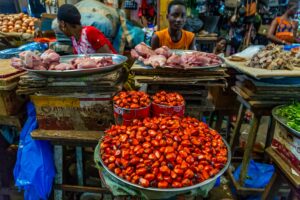
Côte d’Ivoire, the world’s leading cocoa and cashew producer, is experiencing one of the fastest sustained economic growth rates in Sub-Saharan Africa in over a decade. With real GDP growth averaging 8.2% between 2012 and 2019, Côte d’Ivoire successfully contained the COVID-19 pandemic and maintained a positive growth rate in 2020 (2%). In 2021, the country returned to its high-growth trajectory and continues to play a central role as a regional economic hub and host country for many nationals from the Economic Community of West African States (ECOWAS) and elsewhere.
Doing business in Côte d’Ivoire
Ease of Doing Business Index Scores
Overall score: 60.7 (2020)
Starting a business score: 93.7 (2020)
Trading across Borders score: 52.4 (2020)
Enforcing Contracts score: 57.6 (2020)
Legal System: The Ivorian legal system is based on the civil law. Cote d’Ivoire became a French protectorate in 1889 and it maintained the French civil law system.
Company creation procedures:
- Open a bank account and deposit the minimum capital at the bank
- Register at the one-stop shop (CEPICI) and request the publication of the notice of company incorporation
- Obtain a company seal (Business founders can make a company seal at a seal maker for approximately XOF 10,000)
- Notify the company’s address to the local Tax Authority (After the company was registered with the Tax Authority, the company’s address must be informed to the local tax authorities.
CEPICI (Investments Promotion Centre in Côte d’Ivoire)
CEPICI is in charge of:
- Ensuring, through its investor’s One Stop Shop the facilitation of administrative formalities related to business creation and management.
- Process, issue and withdraw investment licenses;
- Ensure the promotion and attraction of national and foreign direct investments in Côte d’Ivoire,
- To contribute to all actions leading to the improvement of the business environment and to make proposals to the Government;
- To contribute to the implementation, as Executing Agency, of Government and Development Partner programs in favor of the private sector in Côte d’Ivoire;
- to be a meeting platform for exchanges and consultation between the public sector and the private sector, in order to initiate and make proposals to the Government to respond to the concerns of the private sector.
Why invest in Côte d’Ivoire?
- A Regional Economic Power: Côte d’Ivoire has solid economic assets. It is a sub-regional power. It contributes more than a third of the WAEMU’s GDP and accounts for 60% of its agricultural exports. It possesses infrastructures inherited from the two decades of the “Ivorian miracle” (1960-1980), rehabilitated and consolidated by massive investments over the last nine years: the second largest port in Sub-Saharan Africa, an important road network, and a recently expanded international airport that is due to undergo a significant transformation in the coming years.
- Numerous Investment Opportunities: Investment opportunities are numerous in almost all sectors:
- The mining potential is very little exploited: only gold and manganese are really exploited industrially. The country is notably richly endowed with nickel, bauxite, iron and diamonds. A geological map currently being drawn up will be made available by the government to potential investors.
- The oil sector, essentially off-shore, is very promising.
- The country intends to position itself as an energy hub for the sub-region in terms of electricity production.
- The processing potential in the agricultural sector is very significant.
- Food needs in fish and poultry products are struggling to be covered, thus offering real investment potential that is very promising.
- The telecommunications sector is in constant expansion, particularly for all services linked to mobile banking, which compensates for the low rate of household banking.
- A young and qualified population: Three-quarters of the population are under 35 years old and the rate of higher education is constantly increasing – supported by a developed public university network and quality private institutions. The country also records an important flow of return of expatriates from the diaspora, often highly qualified. Moreover, it is home to 21% of the population of the UEMOA and offers employment opportunities to quality human resources from the countries of the sub-region.
- A stable currency: Côte d’Ivoire is part of the West African CFA franc zone, which benefits from free convertibility and a fixed parity with the euro as well as great flexibility in terms of exchange regulations. The right for foreign investors to repatriate without any particular restriction, the net profit realized after payment of the taxes due, has applied without any hindrance since 1960. This is a tradition.
- A very favorable business climate, recognized on the continent and constantly improving Côte d’Ivoire has embarked on a continuous process of improving the business climate, which is regularly praised by the World Bank’s “Doing Business” study: in 2020, the country ranks second among French-speaking Sub-Saharan African countries in this respect.
Health
A passport, visa, and proof of vaccination against Yellow Fever are required for entry into Côte d’Ivoire.
It is strongly recommended that you visit a travel vaccination clinic and get other vaccinations and a prophylaxis for malaria.
COVID-19
International travel to Côte d’Ivoire is permitted. There are currently no quarantine or health testing requirements. Transmission of COVID-19 is unknown in Côte d’Ivoire.
Immigration
E-visas are available at the airport upon arrival, they must be requested online prior to arrival in Côte d’Ivoire. Applications for entry visas to Côte d’Ivoire can be submitted online exclusively via the platform https://snedai.com/e-visa/. Through the platform applicants do an online pre-enrolment followed by the online payment of required fees, then application is processed by the competent Côte d’Ivoire authorities within 48 hours. The applicant will receive in an email attachment the response to the application through a document with a barcode, the document is valid for three months. The applicant will travel with the “Approved pre-enrollment” document and presents himself on arrival at the airport to the “Airport visa” area. The applicant will perform his biometric enrollment there and the visa will be printed and issued immediately.
Main entry point in Côte d’Ivoire is Félix Houphouët Boigny International Airport (code IATA : ABJ).
Unique Facts about Côte d’Ivoire
Two Capital Cities: Here is an interesting fact about Ivory Coast that many don’t know. The country is one of 4 African countries with two capital cities. The other 3 are Eswatini, South Africa, and Tanzania. The two capital cities of Ivory Coast are Yamoussoukro and Abidjan. Yamoussoukro became the official capital in 1983 after the country’s independence. However, Abidjan has remained the country’s official administrative capital. Most countries’ embassy in Ivory Coast is situated in Abidjan.
Largest French Speaking City: Did you know the country also houses the third-largest French-speaking city in the world? That’s a cool fact about Ivory Coast. Abidjan in Ivory Coast is home to at least 5.6 million French-speaking people making it the third largest French-speaking city in the world behind only Paris (France) and Kinshasa (Democratic Republic of Congo).
Queen Pokou: A fascinating story or fact about Ivory Coast that many don’t know.
One of the country’s famous and dominant ethnic groups (Baoule) was founded by Queen Poku, also known as (Awura, Aura, or Abla Pokou). She was born as a princess to the ruler of the Ashanti Empire (a Ghanian empire of Kumasi), Nyakou Kosiamoa. Due to succession conflicts, she made a breakaway with her followers with intentions to move to the west. But as you know, there is no gain without pain. It was recorded that the queen lost her son during their journey in search of greener pastures. She sacrificed him to the gods of the Comoe river by drowning him when they were crossing the river. After throwing her infant child into the water, it was said that hippos came from the water creating a bridge for the people to cross on their backs. The Comoe river was one of many rivers they crossed before reaching their destination. When they arrived, they focused on agriculture as their primary source of living. Today, Baoule makes up the largest ethnic group in the country.
Abidjan Highlights
The city of Abidjan has many attractions ranging from its proximity to the lagoon, its maritime facade to its “skyscrapers” of the Plateau, its Saint-Paul cathedral, its luxury hotels, its shopping centers, its bay of billionaires, its luxurious villas… But, like all its beautiful assets, “the pearl of the lagoons” is a West African socio-cultural hub, where you can also find cuisine from neighboring countries (Benin, Senegal, Mali, Nigeria, Ghana…) and countries in the Middle East (Lebanon in particular). As for international cuisine, Abidjan has a good number of cellars and Western and Asian restaurants, the best of which are mostly located in Zone 4 in the town of Marcory.
The Bingerville Botanical Garden
The Bingerville Botanical Garden in Abidjan, Ivory Coast, stands as a serene oasis, enchanting visitors with its lush greenery and diverse plant life. Established in 1902, this historic garden covers over 30 hectares and serves as a living repository of the region’s flora. Home to rare and exotic species, the garden offers a peaceful retreat where visitors can explore winding paths, admire vibrant flowers, and learn about indigenous plants. Educational programs and events are hosted, making it a hub for both nature enthusiasts and students. The Bingerville Botanical Garden remains a botanical treasure, contributing to conservation and public awareness.
The Museum of Civilizations
The Museum of Civilizations of Côte d’Ivoire, located in Abidjan, is a cultural gem that delves into the nation’s diverse heritage. Established in 1942, the museum showcases an extensive collection of artifacts, art, and historical items, spanning from pre-colonial times to the present day. Exhibits meticulously depict the country’s rich cultural tapestry, emphasizing the traditions, lifestyles, and artistic expressions of various ethnic groups. With a focus on fostering cultural appreciation and understanding, the museum provides a comprehensive narrative of Côte d’Ivoire’s evolution. Its curated displays, ranging from traditional masks to contemporary art, offer a captivating exploration of the nation’s identity.
The Floating Island
Its designer collected hundreds of thousands of plastic bottles that polluted the surroundings to install an artificial island in the Ebrié lagoon with a restaurant, small swimming pools and even a few rooms and a seminar area.
The Bushman Cafe
The Bushman Cafe is a well-loved dining establishment in Abidjan, Ivory Coast, renowned for its South African-inspired cuisine, warm hospitality, and laid-back ambiance. Located in the heart of the Pearl shopping district, the cafe offers a delightful culinary experience with its distinctive flavors and inviting atmosphere.
The Craft Center of Abidjan
The Craft Center of Abidjan, Ivory Coast, is a vibrant showcase of traditional craftsmanship and artistic prowess. Nestled in the heart of the city, this cultural hub brings together skilled artisans who create a diverse array of handmade crafts. Visitors can explore intricately crafted wood carvings, vibrant textiles, beaded jewelry, and other locally-produced artworks. The center serves as a dynamic marketplace where the rich cultural heritage of Ivory Coast comes to life. Tourists and locals alike are drawn to the authenticity of the crafts, offering an immersive experience into the artistic traditions that define the region, making it a must-visit destination for those seeking unique, locally crafted treasures.
The Coconut Grove Lodge
Nestled in the tranquility of Billionaire Bay (Ile Boulay), the Coconut Grove Lodge beckons with its secluded charm, accessible primarily by a scenic 20-minute boat ride from Abidjan. Perched along the lagoon, this idyllic retreat promises serene views, a haven of silence, and exceptional cuisine. Accommodation options are diverse, ranging from the Vintage Beige Suite to the Purple Caribbean family room, offering an ideal retreat for 2-4 people. Immerse yourself in a spectrum of activities, from horse riding to strolls on the floating pontoon, lagoon, and sea fishing. With prices ranging from 25,000 FCFA to 200,000 FCFA, customer reviews consistently applaud the lodge as a paradisiacal haven on Boulay Island, lauding its respite from city pollution, delectable cuisine, warm hospitality, and a plethora of engaging activities.
Côte d’Ivoire Travel Business Assistance
Are you planning to move your business to Côte d’Ivoire or open up Côte d’Ivoire as a new market? Perhaps there is a conference in Côte d’Ivoire you need to attend and you need some help. We are here for your Côte d’Ivoire Travel business assistance.
